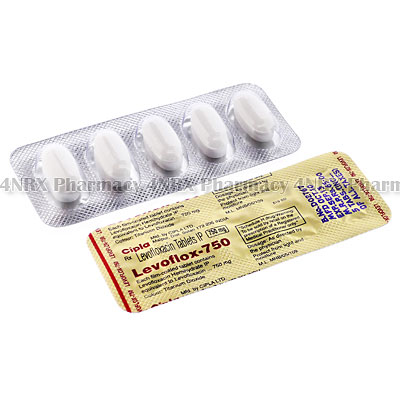 |
Home  Infection Infection  Levoflox 750 (Levofloxacin) Levoflox 750 (Levofloxacin) |
|
|||||||||
|
Levoflox 750 (Levofloxacin)
What is Levoflox 750 (Levofloxacin) used for? Levoflox 750 (Levofloxacin) is used to treat a variety of bacterial infections. These can include skin, bladder, kidney, prostate, and sinus infections. Additionally, this antibiotic drug can treat infections resulting from bronchitis or pneumonia, as well as benefit patients who have been exposed to anthrax. It is important to note that this medication is only effective in treating bacterial infections, and it will not prove effective treating fungal or viral infections. Also be aware that overuse of antibiotics can result in reduced effectiveness for future infections. How should I use Levoflox 750 (Levofloxacin)? As with any antibiotic, it is essential you always complete the full course of medication prescribed by your physician, even if the infection appears to have been eliminated. If allowed to, infections can relapse stronger than before and more resistant to antibiotics. This medication can be taken with or without food, but should always be washed down using a full glass of water. If you experience some stomach discomfort after dosing, you can alleviate this by dosing alongside a snack or meal. What are the side effects of Levoflox 750 (Levofloxacin)? Common side effects you may experience while using Levoflox (Levofloxacin) include:
More severe symptoms which require immediate attention include:
Please Note Levoflox 750 (Levofloxacin) may increase the skin's sensitivity to UV rays. Do not use any kind of tanning beds or UV lamps while using this medication. Avoid direct exposure to direct sunlight as much as possible, and wear sun block and/or protective clothing when it cannot be avoided. Strictly follow all instructions provided to you by your physician or pharmacist while using Levoflox 750 (Levofloxacin). Optimum and safe dosage can differ based on the patient and the condition being treated. As this medication may be unsafe for certain patients, it is essential you always inform your physician if you are pregnant or breastfeeding, as well as if you have any allergies, other illnesses, or ongoing health conditions, and if you are taking any other form of medication, supplements, or herbal products. Immediately seek emergency medical care if you have any allergic or hypersensitive reaction. Common signs of a reaction include hives, swelling, skin rashes, chest pains, as well as trouble breathing or swallow. 

|
|||||||||||||||||